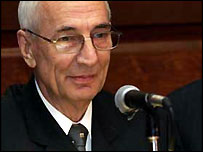Yuri Schmidt: Putin’s ECHR Ploy Doesn’t Stand
 Yesterday Mr Putin once again declared publicly that Mikhail Khodorkovsky is not a political prisoner, inasmuch as the European Court of Human Rights supposedly said so in May 2011. Such a pronouncement can only mean either that Mr Putin is not informed about the true substance of the ECHR’s May 2011 decision, or that the president is deliberately misleading his audience.
Yesterday Mr Putin once again declared publicly that Mikhail Khodorkovsky is not a political prisoner, inasmuch as the European Court of Human Rights supposedly said so in May 2011. Such a pronouncement can only mean either that Mr Putin is not informed about the true substance of the ECHR’s May 2011 decision, or that the president is deliberately misleading his audience.
In connection with this we would like to explain to the law school graduate Mr Putin just what the ECHR judgment in respect of Khodorkovsky’s first application did say, so that in future we would not even have to consider the option that the head of state is underinformed.
The ECHR was not ruling on the outcome of the “Khodorkovsky case”; that is, it did not examine the existence of political motivation in the issuance of the verdict by the Meshchansky and Basmanny courts. Khodorkovsky’s first trial and verdict are still to be examined in applications which have not yet been ruled upon by the ECHR, and which it is improper for Mr Putin to prejudge. In the May 2011 ECHR judgment in respect of Mikhail Borisovich’s first application, which concerned his arrest and detention from 2003 to 2005, the ECHR agreed with the applicant on most aspects of the unlawfulness of his arrest and detention.
The ECHR never declared that there was no political motivation in the Khodorkovsky case. On the contrary, it is said in the May 2011 judgment that “the applicant’s case may raise a certain suspicion as to the real intent of the authorities”. Under a new rule established by the ECHR in this case, however, the judges said they still required “incontrovertible and direct proof” demonstrating that the whole Russian system of justice was politically used in connection with Khodorkovsky’s arrest and detention from 2003 to 2005. In suggesting that the ECHR ruling can be taken to mean that today Khodorkovsky is not a political prisoner, Mr Putin ignores the ECHR’s recognition of suspicions as to the real intent of the authorities, and wrongly interprets the ECHR’s requirement for more proof. And all this pertaining to 2003 to 2005, when we are now in 2012!
It is worth adding that in 2011, Mikhail Khodorkovsky and Platon Lebedev completed the 8-year sentences from their first trial, and they are now in prison serving the sentences of their second trial, handed down in 2010. Khodorkovsky and Lebedev are prisoners of conscience today – as was declared in 2011 by such a highly prestigious international organisation as Amnesty International – on the basis of a trial which the ECHR has in fact not yet examined and may not examine for a few years to come.



